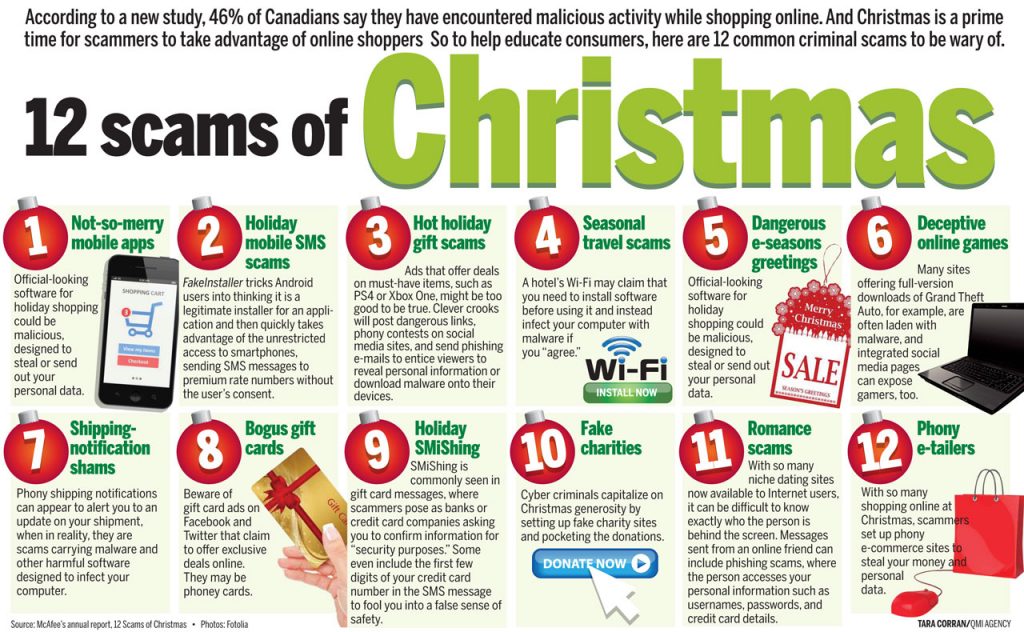“It’s that time of the year again” when Holiday and Christmas scams target users around the world since millions of people are celebrating and buying gifts for friends and family. Most people prefer shopping online and that is where hackers and cybercriminals take full advantage of the situation and scam unsuspecting users.

Here are some Holiday and Christmas scams you should be aware of:
1. Fake online gift stores
Fake online gift stores are one of the most successful ways of tricking shoppers into handing over their banking data. These stores offer a jaw-dropping discount which naturally catches attention for those willing to spend less and get more in return. But it all ends up ruining holiday season as the sole purpose of such stores are stealing your data for their use.

Do not worry, you still can find out if that amazing sale or discount is real by doing some social engineering, Googling about the store, looking for its social media presence. Pro tip: Use Who.is to check who owns the store’s domain and when was it registered. If “these stores” pop up days or weeks before the holiday season it is an alarm for sure.
2. Phishing scams
Phishing attacks are not just increasing, they’re also evolving and when it is holiday season scammers tend to target users more than ever. In some cases, it has been noticed that a phishing email plays with the religious sentiments of people and use charity related verses from scriptures to trick people into sending donations.

In some cases, scammers use fake donation sites to steal user data such as social media or email credentials and banking data of victims. In some cases, the phishing email invites victims to fake Christmas markets and ask them to sign up with their banking and personal data such as name, address and contact number.
3. Oprah Winfrey Chrismas cash giveaway scam
For some reason, Hollywood celebrities are often used in the distribution of online scams. Like every year, this time scammers are using Oprah Winfrey’s name to conduct a Christmas cash giveaway scam on Instagram.

This type of scams is also known as “Secret Sister Scam.” In this scam, Instagram users are being told to follow Oprah’s fake account on the site and share it with their friends to earn $5,000 (€4,216). However, not only the account is fake the purpose of it is to get followers on the social media site. Oprah also noticed the scam and used Twitter to address the issue calling it “Fraud Alert.”
4. Holiday jobs
For businesses, the holiday season is hectic and requires more manpower. For this, scammers post fake job listings to lure users into making quick cash, however, depending on the seriousness some scams steal candidates’ personal data while some asks for money to sign up for the job. Remember, if someone asks for money or Social Security Number (SSN) consider it a scam and do not fall for it.
5. Fake Gift Shipping Alerts
It might feel great to receive gifts but during holiday season scammers send specially crafted emails informing users about the delivery of a gift that they never ordered or in case they did, it has been delivered to a wrong address. Either way, victims are asked to click on a link to confirm that they ordered the delivery and that is where their personal information or card details are targeted.

6. Malware scams
As discussed above, scammers use phishing emails to steal personal data, however, infecting users with malware is also one of the things a phishing email can do. Yet, there are tons of ways in which a malware can infect your devices such as Christmas card embedded with a malicious file, sending the malware-infected link in an email or using instant messaging services like Facebook Messenger, Skype and WhatsApp.

In this case, remember never click on any link coming from an unknown email and avoid clicking or downloading attachments. In case your device is infected with malicious software run an in-depth antivirus scan as it can be malware equipped with ransomware capabilities that end up locking your files and asking for money to receive a decryption key.
There are several other scams such as Hotel scams, E-cards scams, E-voucher scams, and Wishlist scams etc. Therefore, be vigilant, shop from authentic and verified online stores, keep an eye on your bank account and card activity and contact the bank in case of any suspicion. If you have gone through the list of this scam alert we hope you will not fall for any Holiday or Christmas scams.
Earlier, researchers revealed that “90% of the people we ask will provide not just the spelling of their names but their email addresses without confirming our identity while 67% of the people we ask will give out social security numbers, birth dates or employee numbers.”
Happy browsing and season greetings.









